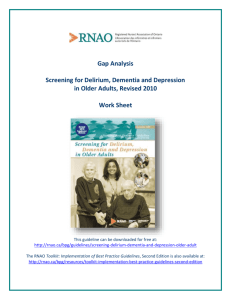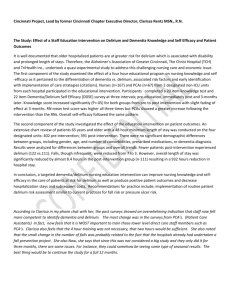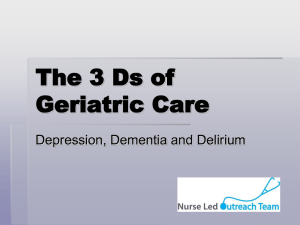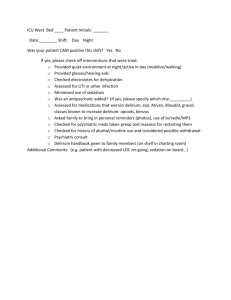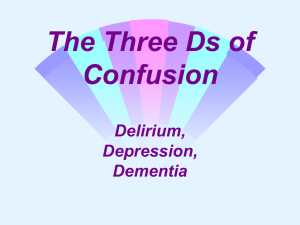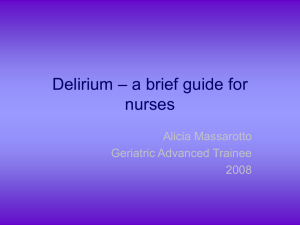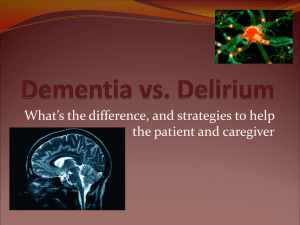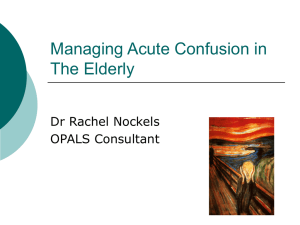Work Sheet Gap Analysis: Screening for Delirium, Dementia and
advertisement
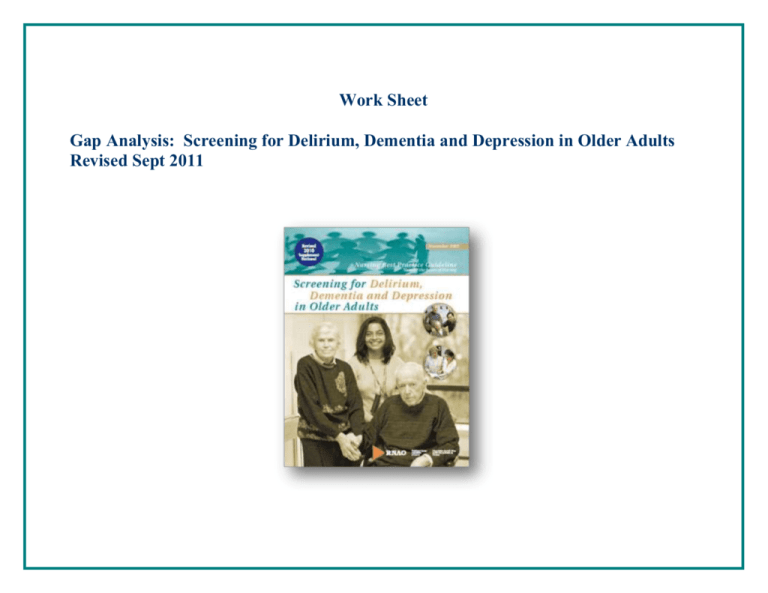
Work Sheet Gap Analysis: Screening for Delirium, Dementia and Depression in Older Adults Revised Sept 2011 Work Sheet Gap Analysis: Screening for Delirium, Dementia and Depression in Older Adults- Revised Sept 2011 MoHLTC RNAO Best Practice Guideline Recommendations Notes Priority Yes No 53. (1) Every licensee of a long-term care home shall ensure that the following are developed to meet the needs of residents with responsive behaviours: 1. Written approaches to care, including screening protocols, assessment, reassessment and identification of behavioural triggers that may result in responsive behaviours, whether cognitive, physical, emotional, social, environmental or other. 1. Nurses should maintain a high index of suspicion for delirium, dementia and depression in the older adult. 2. Written strategies, including techniques and interventions, to prevent, minimize or respond to the responsive behaviours. 3. Nurses must recognize that delirium, dementia and depression present with overlapping clinical features and may coexist in the older adult. 2 .Nurses should screen clients for changes in cognition, function, behaviour and/or mood, based on their ongoing observations of the client and/or concerns expressed by the client, family and/or interdisciplinary team, including other specialty physicians 4. Nurses should be aware of the differences in the clinical features of delirium, dementia and depression and use a structured assessment method to facilitate this process. 3. Resident monitoring and internal reporting protocols. 5. Nurses should objectively assess for cognitive changes by using one or more 2 Work Sheet Gap Analysis: Screening for Delirium, Dementia and Depression in Older Adults- Revised Sept 2011 MoHLTC 4. Protocols for the referral of residents to specialized resources where required RNAO Best Practice Guideline Recommendations standardized tools in order to substantiate clinical observations. Notes Priority Yes No 7. When the nurse determines the client is exhibiting features of delirium, dementia and/or depression, a referral for a medical diagnosis should be made to specialized geriatric services, specialized geriatric psychiatry services, neurologists, and/or members of the multidisciplinary team, as indicated by screening findings. (2) The licensee shall ensure that, for all programs and services, the matters referred to in subsection (1) are, (a) integrated into the care that is provided to all residents; 1. Nurses should maintain a high index of suspicion for delirium, dementia and depression in the older adult. 2.Nurses should screen clients for changes in cognition, function, behaviour and/or mood, based on their ongoing observations of the client and/or concerns expressed by the client, family and/or interdisciplinary team, including other specialty physicians. (b) based on the assessed needs of residents with responsive behaviours; and 3. Nurses must recognize that delirium, dementia and depression present with overlapping clinical features and may coexist in the older adult. 3 Work Sheet Gap Analysis: Screening for Delirium, Dementia and Depression in Older Adults- Revised Sept 2011 MoHLTC RNAO Best Practice Guideline Recommendations Notes Priority Yes No 4. Nurses should be aware of the differences in the clinical features of delirium, dementia and depression and use a structured assessment method to facilitate this process. 6. Factors such as sensory impairment and physical disability should be assessed and considered in the selection of mental status tests. (c) co-ordinated and implemented on an interdisciplinary basis. 7. When the nurse determines the client is exhibiting features of delirium, dementia and/or depression, a referral for a medical diagnosis should be made to specialized geriatric services, specialized geriatric psychiatry services, neurologists, and/or members of the multidisciplinary team, as indicated by screening findings. 10. Organizations should consider screening assessments of the older adult’s mental health status as integral to nursing practice. Integration of a variety of professional development opportunities to support nurses in effectively developing skills in assessing the individual for delirium, dementia and depression is recommended. These opportunities will vary depending on 4 Work Sheet Gap Analysis: Screening for Delirium, Dementia and Depression in Older Adults- Revised Sept 2011 MoHLTC RNAO Best Practice Guideline Recommendations model of care and practice setting. Notes Priority Yes No (3) The licensee shall ensure that, (a) the matters referred to in subsection (1) are developed and implemented in accordance with evidence-based practices and, if there are none, in accordance with prevailing practices; (b) at least annually, the matters referred to in subsection (1) are evaluated and updated in accordance with evidencebased practices and, if there are none, in accordance with prevailing practices; and (c) a written record is kept relating to each evaluation under clause (b) that includes the date of the evaluation, the names of the persons who participated in the evaluation, a summary of 1. Nurses should maintain a high index of suspicion for delirium, dementia and depression in the older adult. 2. Nurses should screen clients for changes in cognition, function, behaviour and/or mood, based on their ongoing observations of the client and/or concerns expressed by the client, family and/or interdisciplinary team, including other specialty physicians. 3. Nurses must recognize that delirium, dementia and depression present with overlapping clinical features and may coexist in the older adult. 4. Nurses should be aware of the differences in the clinical features of delirium, dementia and depression and use a structured assessment method to facilitate this process. 5. Nurses should objectively assess for cognitive changes by using one or more standardized tools in order to substantiate 5 Work Sheet Gap Analysis: Screening for Delirium, Dementia and Depression in Older Adults- Revised Sept 2011 MoHLTC the changes made and the date that those changes were implemented. RNAO Best Practice Guideline Recommendations clinical observations. Notes Priority Yes No 9. All entry-level nursing programs should include specialized content about the older adult, such as normal aging, screening assessment and caregiving strategies for delirium, dementia and depression. Nursing students should be provided with opportunities to care for older adults. 10. Organizations should consider screening assessments of the older adult’s mental health status as integral to nursing practice. Integration of a variety of professional development opportunities to support nurses in effectively developing skills in assessing the individual for delirium, dementia and depression is recommended. These opportunities will vary depending on model of care and practice setting. 11. Nursing best practice guidelines can be successfully implemented only where there are adequate planning, resources, organizational and administrative support, as well as appropriate facilitation. Organizations may wish to develop a plan for implementation that includes: 6 Work Sheet Gap Analysis: Screening for Delirium, Dementia and Depression in Older Adults- Revised Sept 2011 MoHLTC RNAO Best Practice Guideline Recommendations An assessment of organizational readiness and barriers to education. Involvement of all members (whether in a direct or indirect supportive function) who will contribute to the implementation process. Dedication of a qualified individual to provide the support needed for the education and implementation process. Ongoing opportunities for discussion and education to reinforce the importance of best practices. Opportunities for reflection on personal and organizational experience in implementing guidelines. In this regard, RNAO (through a panel of nurses, researchers and administrators) has developed the “Toolkit: Implementation of clinical practice guidelines”, based on available evidence, theoretical perspectives and consensus. The RNAO strongly recommends the use of this Toolkit for guiding the Notes Priority Yes No 7 Work Sheet Gap Analysis: Screening for Delirium, Dementia and Depression in Older Adults- Revised Sept 2011 MoHLTC RNAO Best Practice Guideline Recommendations implementation of the best practice guideline on “Screening for Delirium, Dementia and Depression in Older Adults”. Notes Priority Yes No (4) The licensee shall ensure that, for each resident demonstrating responsive behaviours, (a) the behavioural triggers for the resident are identified, where possible; 1. Nurses should maintain a high index of suspicion for delirium, dementia and depression in the older adult. 2.Nurses should screen clients for changes in cognition, function, behaviour and/or mood, based on their ongoing observations of the client and/or concerns expressed by the client, family and/or interdisciplinary team, including other specialty physicians. (b) strategies are developed and implemented to respond to these behaviours, where possible; and 6. Factors such as sensory impairment and physical disability should be assessed and considered in the selection of mental status tests. 8. Nurses should screen for suicidal ideation and intent when a high index of suspicion for depression is present, and seek an urgent medical referral. Further, 8 Work Sheet Gap Analysis: Screening for Delirium, Dementia and Depression in Older Adults- Revised Sept 2011 MoHLTC (c) actions are taken to respond to the needs of the resident, including assessments, reassessments and interventions and that the resident’s responses to interventions are documented. RNAO Best Practice Guideline Recommendations should the nurse have a high index of suspicion for delirium, an urgent medical referral is recommended 10. Organizations should consider screening assessments of the older adult’s mental health status as integral to nursing practice. Integration of a variety of professional development opportunities to support nurses in effectively developing skills in assessing the individual for delirium, dementia and depression is recommended. These opportunities will vary depending on model of care and practice setting. Notes Priority Yes No ALTERCATIONS AND OTHER INTERACTIONS Altercations and other interactions between residents 54. Every licensee of a long-term care home shall ensure that steps are taken to minimize the risk of altercations and potentially harmful interactions between and among residents, including, (a) identifying factors, based 1. Nurses should maintain a high index of on an interdisciplinary suspicion for delirium, dementia and assessment and on depression in the older adult. information provided to the 9 Work Sheet Gap Analysis: Screening for Delirium, Dementia and Depression in Older Adults- Revised Sept 2011 MoHLTC licensee or staff or through observation, that could potentially trigger such altercations; and RNAO Best Practice Guideline Recommendations 2. Nurses should screen clients for changes in cognition, function, behaviour and/or mood, based on their ongoing observations of the client and/or concerns expressed by the client, family and/or interdisciplinary team, including other specialty physicians. Notes Priority Yes No 4. Nurses should be aware of the differences in the clinical features of delirium, dementia and depression and use a structured assessment method to facilitate this process. 5. Nurses should objectively assess for cognitive changes by using one or more standardized tools in order to substantiate clinical observations. 6. Factors such as sensory impairment and physical disability should be assessed and considered in the selection of mental status tests. (b) identifying and implementing interventions. 8. Nurses should screen for suicidal ideation and intent when a high index of suspicion for depression is present, and seek an urgent medical referral. Further, should the nurse have a high index of suspicion for delirium, an urgent medical referral is recommended. 10 Work Sheet Gap Analysis: Screening for Delirium, Dementia and Depression in Older Adults- Revised Sept 2011 MoHLTC RNAO Best Practice Guideline Recommendations Notes Priority Yes No 9. All entry-level nursing programs should include specialized content about the older adult, such as normal aging, screening assessment and caregiving strategies for delirium, dementia and depression. Nursing students should be provided with opportunities to care for older adults. 10. Organizations should consider screening assessments of the older adult’s mental health status as integral to nursing practice. Integration of a variety of professional development opportunities to support nurses in effectively developing skills in assessing the individual for delirium, dementia and depression is recommended. These opportunities will vary depending on model of care and practice setting. Behaviours and altercations 55. Every licensee of a longterm care home shall ensure that, (a) procedures and interventions are developed and implemented to assist residents and staff who are at risk of harm or who are 1. Nurses should maintain a high index of suspicion for delirium, dementia and depression in the older adult. 2. Nurses should screen clients for 11 Work Sheet Gap Analysis: Screening for Delirium, Dementia and Depression in Older Adults- Revised Sept 2011 MoHLTC harmed as a result of a resident’s behaviours, including responsive behaviours, and to minimize the risk of altercations and potentially harmful interactions between and among residents; and (b) all direct care staff are advised at the beginning of every shift of each resident whose behaviours, including responsive behaviours, require heightened monitoring because those behaviours pose a potential risk to the resident or others. RNAO Best Practice Guideline Recommendations changes in cognition, function, behaviour and/or mood, based on their ongoing observations of the client and/or concerns expressed by the client, family and/or interdisciplinary team, including other specialty physicians. Notes Priority Yes No 4. Nurses should be aware of the differences in the clinical features of delirium, dementia and depression and use a structured assessment method to facilitate this process. 5. Nurses should objectively assess for cognitive changes by using one or more standardized tools in order to substantiate clinical observations. 8. Nurses should screen for suicidal ideation and intent when a high index of suspicion for depression is present, and seek an urgent medical referral. Further, should the nurse have a high index of suspicion for delirium, an urgent medical referral is recommended. 9. All entry-level nursing programs should include specialized content about 12 Work Sheet Gap Analysis: Screening for Delirium, Dementia and Depression in Older Adults- Revised Sept 2011 MoHLTC RNAO Best Practice Guideline Recommendations the older adult, such as normal aging, screening assessment and caregiving strategies for delirium, dementia and depression. Nursing students should be provided with opportunities to care for older adults. Notes Priority Yes No 10. Organizations should consider screening assessments of the older adult’s mental health status as integral to nursing practice. Integration of a variety of professional development opportunities to support nurses in effectively developing skills in assessing the individual for delirium, dementia and depression is recommended. These opportunities will vary depending on model of care and practice setting. 13
